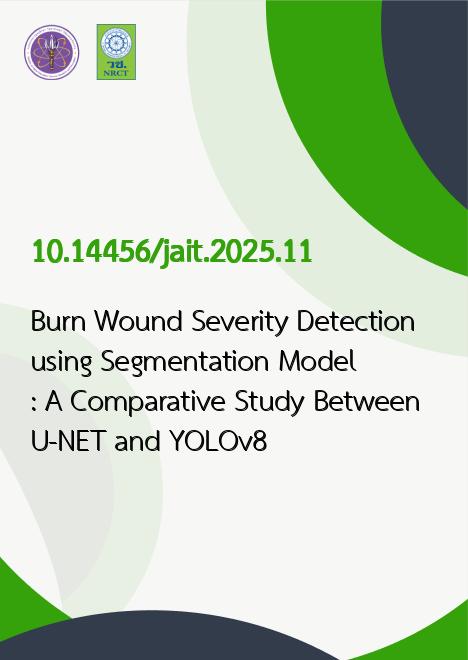
|
Burn Wound Severity Detection using Segmentation Model: A Comparative Study Between U-NET and YOLOv8 |
|---|---|
| รหัสดีโอไอ | |
| Creator | Kwankamon Dittakan |
| Title | Burn Wound Severity Detection using Segmentation Model: A Comparative Study Between U-NET and YOLOv8 |
| Contributor | Sorawit Nookong |
| Publisher | Faculty of Informatics, Mahasarakham University |
| Publication Year | 2568 |
| Journal Title | Journal of Applied Informatics and Technology |
| Journal Vol. | 7 |
| Journal No. | 1 |
| Page no. | 153-173 |
| Keyword | Skin Burn, Burn Wound, Skin Burn Severity Detection, Image Analytics, U-Net, Deep Learning |
| URL Website | https://ph01.tci-thaijo.org/index.php/jait |
| Website title | Journal of Applied Informatics and Technology |
| ISSN | 3088-1803 |
| Abstract | This research focuses on detecting burn severity using an area of interest detection approach. The burn areas are categorized into three levels: (i) first-degree burns, (ii) second-degree burns, and (iii) third-degree burns, each with distinct visual characteristics. To detect burn severity, artificial intelligence (AI) techniques were applied through the development of two models: U-Net and YOLOv8. A dataset of 2,000 images representing all three levels of burns was used in the experiments. The goal was to compare the performance of U-Net, a widely used model for segmenting areas of interest, with YOLOv8, a newer model introduced in 2023. Experimental results show that the best performance of U-Net achieved an accuracy of 79.1% and a loss value of 79.8%. In contrast, YOLOv8 achieved its best result with an [email protected] of 0.657, a segmentation loss of 3.231, and a classification loss of 1.961. These results represent the optimal performance of both models in this study. |